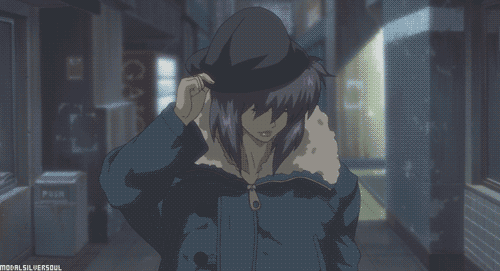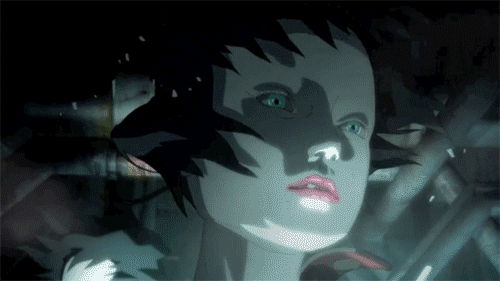Ghost in the Shell Review
The animated companion to Blade Runner, Ghost in the Shell seeks to delve even deeper into the nature of identity than its predecessor, distinguishing itself with a more political story and its backdrop as the advent of the information age. An animated art film is a nigh-singular achievement. It’s a cross-section of two genres you almost never get, and a great one to boot.
Motoko the cyborg ponders the nature of self. When a completely artificial body gains a ghost, or soul/identity, she drifts into solipsism and begins to doubt the notion that her identity even exists. She feels that maybe her actual brain tissue has died or was taken over by the electronic portion. This is important because another theme of this movie is “from many come one (E Pluribus Unum),” or the singular life created by all of us. Is individuality inherent or is it created by your environment, defeating its purported usefulness? Has the internet (or this film’s vision of it, the film’s also quite prescient) that her brain can access taken over her personality completely? This is a metaphor for having one’s individuality disappearing into an interconnected world.

It then turns out that the Puppet Master wants to essentially mate with her because she is who she is. The film ends with their “offspring” (Motoko’s head mounted on a child-cyborg body, in a bit of obvious symbolism) looking into the future. This is a callback to the end of 2001: A Space Odyssey, when the new stage in evolution looks upon the world, ready for everyone to progress. The separation of body and soul in identity has been another major theme, but that the puppet master seems to embrace both aspects of her identity. This very cold movie, therefore, makes a fairly heartfelt statement about love: your individuality is what attracts people to you, and that’s its purpose on a primal level.
The Puppet Master’s motivation is to reproduce and die. It needs to establish itself as a living being just as Motoko does. It does so in the most basic of ways: carrying out the most natural, base functions of life, reproduction, and death. This is a stinging reminder that life doesn’t have to be complicated (ironic, yet subversive given the narrative). Leaving your mark is as simple as carrying on your lineage.

Ghost in the Shell is very political in a way that completely ties into its more humanistic themes as well. A key theme is a country’s sovereignty versus cooperation. After all, what is a nation but a sovereign entity made up of many individuals? Can countries continue to remain separate further in the information age? Does humanity’s inherent lust for conflict hold us back or is it just a symptom of our incompatible individualities? Granting an individual hated by many in another nation asylum in your country means cutting ties with that nation. Does every individual share the burden of the animosity of the other nation if you take him in? Does the other nation deserve its aid cut? Such are the pitfalls of nations in general. Individuals make them up together, but they end up homogenizing everyone. This applies not just to countries but to existence in general.
At one point, a man has false memories of a wife and child implanted into him a la Blade Runner. This adds to the allusions to solipsism and offers another genuinely heartfelt moment when he finds out they were fake. Given that the memories implanted had to be of someone, it stands to reason that they actually happened. This diminishes the hope for individuality to prevail in a world built on increasingly literal shared experiences. Also, which is more valuable, “real” data you collect on your own or “fantasy” data collected through vicariousness?

The film’s two action scenes are incredible. First of all, spider-tanks are always cool as hell. But the earlier one is the showstopper, featuring some of the most beautiful animation ever created. It’s very brief, but the film actually does deliver on a visceral level in these sequences. They’re nearly enough on their own to explain why so many people uninterested in the actual ruminations sat through the film.
Motoko being framed in a distanced, non-sexual way and the fact that she sheds her clothing to become invisible, symbolizes the emptiness of mere sexual connection. She lacks nipples and genitalia, the two places on the female body where meaningful, purposeful human connection is actually made. This serves to further tangibly dehumanize her as well. There’s another shot of mannequins that also lack nipples, speaking to the hollowness of sexuality on the part of the entire culture. Without this, the earlier point about reproduction could have been dismissed as just as ultimately meaningless.

This is a real art film that somehow got popular and has been overlooked as the actual complex, deeply resonant film it actually is. It’s likely even better than its peer: Oshii’s other, underrated classic, Angel’s Egg. However, it’s simply too hard to give it a perfect rating due to its aggressive use of tell-don’t-show. Ghost in the Shell is so very short that it could have easily lengthened its minuscule running time to expound on a couple of story elements a little more substance. These few story concerns keep it from being perfect.
A complex rumination on the very nature of existence, Ghost in the Shell proves itself to be better than any otaku craving only action and sex, and all of it in pretty colors ever made it out to be. How this got popular is a mystery, but no matter the cause, its fame is a good thing. It’s possibly the most interesting animated film of all time.
– Simon Opitz
Editor’s Note: This article was originally published on September 26, 2013, under our old brand, Sound On Sight.
































